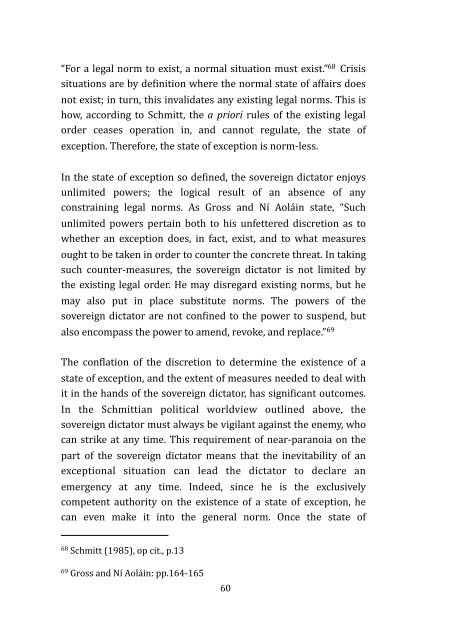States of Emergency - Centre for Policy Alternatives
States of Emergency - Centre for Policy Alternatives
States of Emergency - Centre for Policy Alternatives
You also want an ePaper? Increase the reach of your titles
YUMPU automatically turns print PDFs into web optimized ePapers that Google loves.
“For a legal norm to exist, a normal situation must exist.” 68 Crisis<br />
situations are by deLinition where the normal state <strong>of</strong> affairs does<br />
not exist; in turn, this invalidates any existing legal norms. This is<br />
how, according to Schmitt, the a priori rules <strong>of</strong> the existing legal<br />
order ceases operation in, and cannot regulate, the state <strong>of</strong><br />
exception. There<strong>for</strong>e, the state <strong>of</strong> exception is norm‐less.<br />
In the state <strong>of</strong> exception so deLined, the sovereign dictator enjoys<br />
unlimited powers; the logical result <strong>of</strong> an absence <strong>of</strong> any<br />
constraining legal norms. As Gross and Ní Aoláin state, “Such<br />
unlimited powers pertain both to his unfettered discretion as to<br />
whether an exception does, in fact, exist, and to what measures<br />
ought to be taken in order to counter the concrete threat. In taking<br />
such counter‐measures, the sovereign dictator is not limited by<br />
the existing legal order. He may disregard existing norms, but he<br />
may also put in place substitute norms. The powers <strong>of</strong> the<br />
sovereign dictator are not conLined to the power to suspend, but<br />
also encompass the power to amend, revoke, and replace.” 69<br />
The conLlation <strong>of</strong> the discretion to determine the existence <strong>of</strong> a<br />
state <strong>of</strong> exception, and the extent <strong>of</strong> measures needed to deal with<br />
it in the hands <strong>of</strong> the sovereign dictator, has signiLicant outcomes.<br />
In the Schmittian political worldview outlined above, the<br />
sovereign dictator must always be vigilant against the enemy, who<br />
can strike at any time. This requirement <strong>of</strong> near‐paranoia on the<br />
part <strong>of</strong> the sovereign dictator means that the inevitability <strong>of</strong> an<br />
exceptional situation can lead the dictator to declare an<br />
emergency at any time. Indeed, since he is the exclusively<br />
competent authority on the existence <strong>of</strong> a state <strong>of</strong> exception, he<br />
can even make it into the general norm. Once the state <strong>of</strong><br />
68<br />
Schmitt (1985), op cit., p.13<br />
69<br />
Gross and Ní Aoláin: pp.164‐165<br />
60











